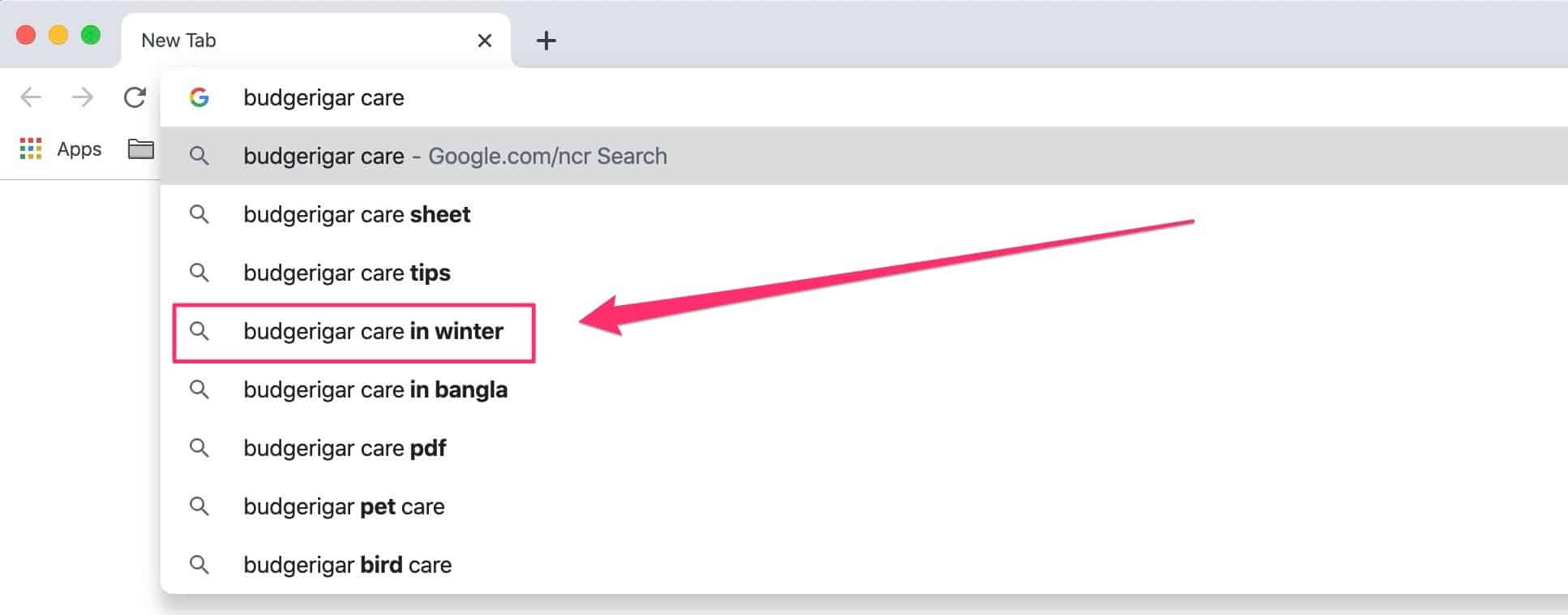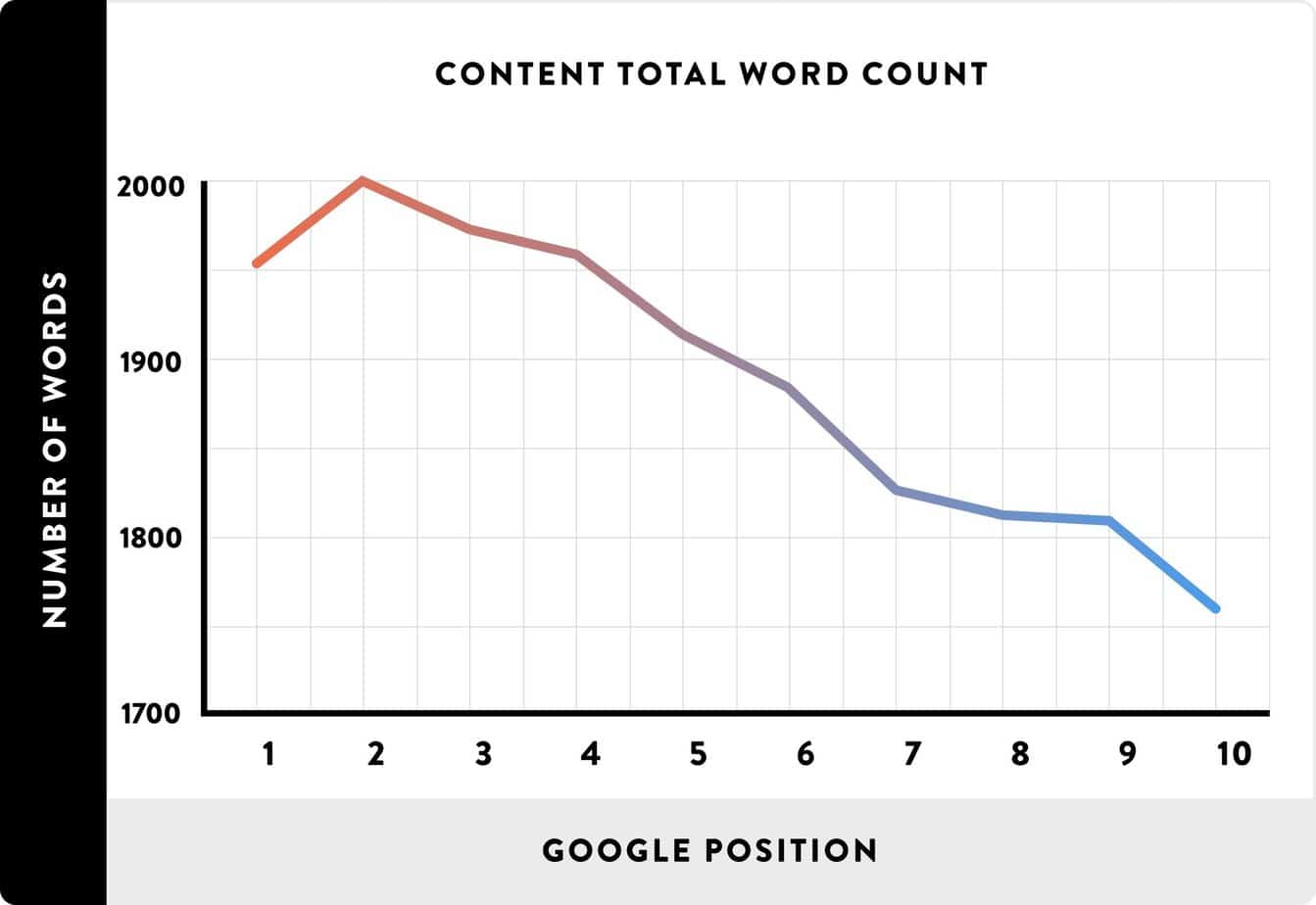There are at least 200 different variables that the Google algorithm considers when it ranks a page. So it’s not easy to point to an ‘SEO recipe for success’.
But there are a handful of SEO ingredients that are more important than any others. And that’s what I’ll show you in this article.
The SEO Recipe for Success
#1. Do Your Keyword Research
The recipe for SEO success starts with keyword research.
Find a keyword by using Google Auto Suggest. Type your seed word (e.g. ‘budgerigar care’) into the Google search bar. And then see what long tail variations (e.g. ‘budgerigar care in winter’) appear in Google Auto Suggest.

Make sure your keyword contains at least three words – less than that, and the competition to get on Page #1 of Google is going to be too much. As a rule of thumb, the more words in your keyword, the less competition there will be.
And don’t worry about search volume. People often worry about whether a given keyword has enough search volume. And so they go and sign up for expensive keyword research tools.
But the truth is, no one (except Google) knows what the search volume is for any particular keyword. And Google doesn’t give that information to anyone. Those premium keyword research tools are just guessing when it comes to search volume.
But you don’t need to worry about search volume.
Why?
Because if a search query appears in Google Auto Suggest, it means people are searching for it. It means there’s enough search volume to justify writing a blog post about it.
#2. Understand Searcher Intent
Searcher intent is a key ingredient in the SEO recipe for success but one that many bloggers leave out.
Searcher intent means understanding what people are looking for when they type a search query into Google.
Here’s an example:
When people type ‘serp checker’ into Google, they are not looking for an article about SERP checkers. They are looking for tools or online apps that will check their search engine rankings.
How do I know this?
Because I typed ‘serp checker’ into Google and the results are full of online tools for checking SERPs.
And you should do the same.
When you’ve identified a keyword that you want to write about, type it into Google and see what comes up. That will tell you what the searcher intent is behind that keyword.
Understanding searcher intent is vital: get it wrong and you won’t rank on Page #1 for your keyword.
Watch This Video: ‘SEO For Beginners: A Basic Search Engine Optimization Tutorial for Higher Google Rankings’ (19 mins 39 secs)
#3. Write Content with High Topical Authority
This is the one ingredient you must have in your SEO recipe for success
Did you know that Google is moving away from keywords? Imagine that the Google algorithm is a Year 12 student – keywords are like something he learned in primary school.
With AI and machine learning, Google now understands entire topics.
By analyzing the way words cluster together in predictable patterns, Google now understands the depth and breadth of any topic. And that means Google can measure the topical authority of a piece of content.
The content with the highest topical authority will rank highest in the search results.
How do I know this?
Because over and over again, I’ve written articles that ranked higher in the search results than pages with much higher domain authority (DA) than mine.
I’ve taken Position #1 or #2 in the search results when my website had a DA of just 24. Below me were websites with DA of 60, 80, and even 90!
How did I do it?
By writing articles with high topical authority.
#4. Write Long Form Content
Research shows that the longer your content, the higher you’ll rank in the search results. Brian Dean of backlinko studied the relationship between length of content and search engine ranking.
This is what he found:

The average word count of a Google first page result is 1,890 words.
And when you think about it, it stands to reason: the more words in your article, the better you will cover your topic.
And as we just saw, topical authority is now a ranking factor.
#5. Do Your On-Page SEO
Install the free version of Yoast SEO and make sure you optimize the following on page elements:
Write a catchy SEO title
This is the title of your page, as it appears in the search results. It doesn’t necessarily have to identical to your page title. Use your keyword near the start of your SEO title. Use words that produce an emotional response, such as: fast, amazing, easy, best, cheapest, free etc. Try to use numbers and/or symbols to make your SEO title stand out from all the others.
Write a compelling meta description
These three or four lines of text are what searchers see when they are browsing the search results.

Use your keyword as close to the start of your meta description as possible. Searchers are scanning the results for the keyword they just typed into Google. Make sure your meta description contains a compelling benefit.
Use your keyword in the first paragraph
Use your keyword in the first paragraph. Remember: when. a searcher clicks through to your page, they are scanning to see if your article addresses their problem.
If they don’t see the keyword they just typed into Google, they’ll hit the back button. So include the keyword in the first paragraph – reassure them that you’ve got their problem covered.
Use your keyword in at least one heading
Use your keyword in at least one heading – it sends a signal to Google that your article does indeed address the topic of your keyword.
Use your keyword in image alt tags
Use your keyword in some of the alt tags of your images. But don’t over-do it. That can look a bit spammy.
Use your keyword in image file names
Instead of naming your images image-01, image-02 etc., use your keyword in the image filename. If your article is about breeding budgerigars, name your image files breeding-budgerigars-01, breeding-budgerigars-02 etc.
Distribute your keyword evenly
Try to distribute your keyword evenly throughout your article. If your keyword appears in the first 100 words and then doesn’t appear again, it looks a bit suspicious.
After all, if your article is about breeding budgerigars, the keyword ‘breeding budgerigars’ would naturally occur throughout the article.
Build internal links
Include some internal links to pages on your own website that deal with the same topic. This creates topic clusters and it tells Google that your website has topical authority for that topic.
Create external links
When you link to high authority websites that are relevant to the topic of your article, you provide a service to your readers.
You also make the Internet that little bit more useful. Google appreciates that and will reward you!
Make your text easy to read
By using short sentences and short paragraphs, you’ll keep your readers on the page for longer.
The longer your readers spend on your page, the higher you’ll rank in the search results. The reason for this is simple: the Google algorithm figures that the longer someone spends on your page, the more likely it is that your page answered their query. And in the end, that’s all Google cares about: matching content to search queries.
Use transitions to keep readers moving down the page
Use transitional phrases as a bridge between one topic and the next. Transitional phrases keep your reader moving down the page. And that means they increase time on page. More time on page means higher ranking in the search results.
Here are some examples of transitional phrases:
- You’re probably wondering how to ‘x’ – that’s what I’m going to show you next
- Stay with me here because I’m going to break this down for you
- So what exactly is ‘x’? That’s what I’m going to show you next
For a detailed guide on how to use transitional phrases in your articles see How to Use Transitional Words and Phrases to Make Your Writing Flow (with Examples).
#6. Get Some Backlinks
Backlinks are the foundation that Google was built upon. When Google started (back in September 1998) they were the only search engine using backlinks as a way to measure the authority of a website.
Google’s reasoning was quite simple: the more links pointing to a page (or a website) the more valuable that content must be.
Because people only link to pages that have valuable content.
Right?
Not exactly.
You can buy (spammy) backlinks on Fiverr and other freelancing websites. These purchased backlinks will typically be (1) from low authority websites and (2) in niches that are not related to yours.
Your backlinks need to be from high authority websites that are in the same niche as your website, or at least a related niche.
There are dozens of ways of getting relevant high authority backlinks. Here’s an article that covers this topic well.
#7. Make Your Website Faster
This is the last ingredient in your SEO recipe for success – speed!
With the July 2018 Google Speed Update, the speed of your website is now a major ranking factor. Google is aware that more than half of all searches are now conducted on mobile devices.
Mobile devices usually have much slower internet connection than desktop devices. Naturally, Google wants to make sure that its search results will load fast on mobile.
And that’s why Google is giving preference to pages that load in less than 2 seconds.
There are many ways to make your website load faster (just as there are many causes of a slow-loading website).
You’ll get the biggest gains in
- Use a CDN (content delivery network) to deliver static resources, such as images (this should cost about $10 p/month)
- Get premium DNS nameservers (you can continue using your existing
web host – just change the nameservers to a premium service) - Install a speed optimization plugin on your website (examples are WP Rocket, WP Fastest Cache, Swift Performance).
Conclusion
Here again is the recipe for SEO success:
- Do keyword research using Google Auto Suggest
- Understand searcher Intent by looking at the results on Page #1
- Write articles with high topical authority
- Write long form content
- Do your On Page SEO
- Get high authority, relevant, backlinks
- Make your website faster
Bake your content with these seven ingredients and you have the recipe for SEO success.
More Articles About SEO
- Search Engine Visibility – 23 Valuable Tips For More Traffic
- Stuck on Page #2 of Google – How To Get Out in 7 Easy Steps
- 13 Types of SEO You Need To Know About in 2022
- What Is SEO? An Introduction to Search Engine Optimization
- Seven Google SEO Trends To Watch For In 2020
- How To Write SEO Friendly Blog Posts – 17 Important Tips
- SEO Off-Page Techniques: 7 Important Facts You Need To Know
- SEO Acronym & What It Means (+ 7 Proven SEO Techniques)
- The Advantages of SEO – 13 Important Facts You Need To Know
- SEO for Blog Posts – 15 Factors To Help You Rank Higher
- 19 SEO Mistakes You Should Avoid At All Costs
- Bing Search Engine Stats – Some Interesting Facts & Figures
- Benefits of SEO for Bloggers – 10 Reasons You Need To Be On Page #1